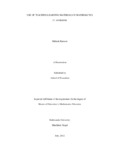
Please use this identifier to cite or link to this item:
https://hdl.handle.net/20.500.14301/211Full metadata record
| DC Field | Value | Language |
|---|---|---|
| dc.contributor.author | Kunwor, Mahesh | - |
| dc.date.accessioned | 2023-04-22T10:11:37Z | - |
| dc.date.available | 2023-04-22T10:11:37Z | - |
| dc.date.issued | 2012-07 | - |
| dc.identifier.citation | Kunwor, M(2012).Use of teaching learning materials in mathematics classroom. | en_US |
| dc.identifier.uri | https://hdl.handle.net/20.500.14301/211 | - |
| dc.description.abstract | Student’s poor learning has been a matter of concern for parents, teachers, and all educational stakeholders. Despite intensive interventions in Nepali public schools in the past 60 years, low learning achievements of students have remained one critical challenge. One argument is for such situation teaching materials are not used in Nepali classrooms resulting in poor learning. What contributes or motivate teachers to use teaching learning materials in mathematics classroom. Successful teaching is possible when teaching materials are used appropriately. Teaching materials are a crucial factor for systematic teaching. They create an interesting environment in the classroom teaching. It has also been found that use of teaching learning materials also contributes to students’ enhanced learning. Teaching learning materials are prominent to use in the classroom for boosting the learning of other concepts, principle and solving the real problem of life by making possible and appropriate transfer of learning. I have gone through different literature related to the teaching learning materials. I have adopted the Bruner’s theory in teaching learning materials and Diene’s teaching theory in mathematics. In order to achieve the objectives of this study, I used survey method. I have selected the schools of three resource centre of ii Lalitpur district where I adopted cluster sampling procedure. I selected 54 schools and 104 mathematics teachers from the schools for the questionnaire by using the statistical formula to find the sample size. I used the descriptive statistics with crosstabs, mean, mode to find the condition of the respondents related to the age, marital status, and budget for teaching learning materials. Correlation test and t-test were also used to find the relationship between the different characteristics of respondent with use of teaching learning materials. The findings have shown that mathematics teachers had positive perception towards the use of teaching learning materials but there are various problems in the reality. The inexperienced teachers and untrained teachers had less used the teaching learning materials than the experienced and trained teachers. Majority of teachers thought that they need to think new way of teaching and presentation and updated method in every new session. There was a significant difference in mean attitude scores between the male and female teachers. Also there was no significant difference in mean attitude scores between teaching level of the teachers. This research indicates that the teachers were not friendly to use the teaching learning materials. I also found that lack of teaching materials and lack of training and less support of school administration are the main challenges for them to use teaching materials. The environment can make the experienced and trained teachers stay on job as a long term basis. The perception of school administrator towards the use of teaching learning materials can find through the research in future. | en_US |
| dc.language.iso | en | en_US |
| dc.title | USE OF TEACHING LEARNING MATERIALS IN MATHEMATICS CLASSROOM | en_US |
| dc.type | Dissertation | en_US |
| local.school.name | SOED | en_US |
| local.school.department | DOSE | en_US |
| local.school.program | Master of Education in Mathematics Education | en_US |
| local.school.level | Masters | en_US |
| Appears in Collections: | Dissertation | |
Files in This Item:
| File | Description | Size | Format | |
|---|---|---|---|---|
| Final thesis_ sept 20_2012mahesh_.pdf | 279.12 kB | Adobe PDF |  View/Open |
Items in DSpace are protected by copyright, with all rights reserved, unless otherwise indicated.